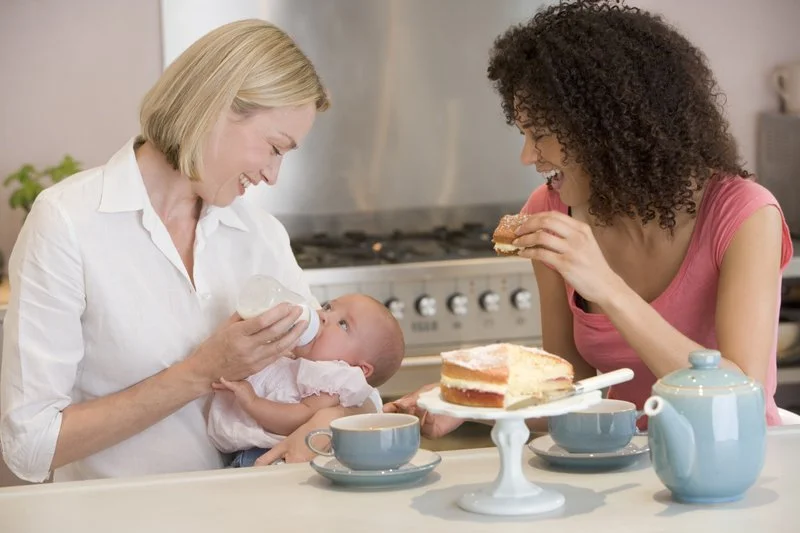Mom Friends: Essential to Your Well-Being
When was the last time you had a night out with friends? You know the night, the one where you find yourself laughing so hard that you forget, even for a moment, all the chaos of life. If you had to think a little too hard about this, you’re not alone. As a therapist who works with moms, I often hear that motherhood has pushed friendships to the back burner. It’s a reminder to moms that you deserve more fun outside the walls of your home and beyond your role as a parent. Because if there’s one thing that I have seen consistently transform the lives of my clients it’s mom friends.
It Gets Better: Accepting Help as a New Mom
Most mothers caring for infants have more things to do than hours in a day. Mothers spend almost all of their time and energy taking care of their new baby, leaving little time for chores and other things like washing clothes, grocery shopping, preparing meals, entertaining visitors, writing thank you notes, packing lunches, cleaning the house.
In the best of circumstances, with support and resources, having a new baby can be a challenge and an adjustment. In circumstances where a mother is experiencing depression or anxiety after childbirth, having a baby can range from a significant stressor to a crisis. There is no right or wrong way to transition into motherhood, but there is always a transition. Try to let go of perfectionist tendencies and know that you are doing the best you can, and that is just fine! Here are 9 things you can try to make your life easier.
Mothering a Mother: 11 Tips to Take Care of a New Mom
Having a baby is an overwhelming, emotional experience. The realization that this tiny and fragile being is completely dependent on you—paired with the physical exhaustion and recovery of delivery, rapid hormonal changes, and sleep deprivation—can be a challenge for any new mother. In recognition of these challenges, many cultures have adapted traditions and rituals for a mother to rest and recuperate and focus solely on bonding with her new baby.
In our culture, we perpetuate the notion that women should experience a smooth and euphoric transition into motherhood. However, practices in the United States do very little to promote this. Hospital stays usually vary from 2-3 days. New mothers are not encouraged to rest or take a hiatus from household responsibilities. In fact, most are expected to resume normal activities as soon as possible, neglecting the seriousness of a woman’s physical and emotional condition after birth. A new baby brings a lot of excitement and happiness to a home, but can also bring a lot of exhaustion. How can we better take care of our mothers?
Tell Me What's Going Well: Changing Negativity
Catherine came to see me when her son was four-months old. She was suffering from postpartum anxiety. She tearfully told me how everything was going wrong. She described feelings of guilt (“I am letting my husband and baby down”), feelings of helplessness (“I just can’t do this) and physical and psychological stress (“I’m breaking out into hives”). I asked her to tell me what was going well. She looked at me surprisingly as she wiped away her tears. It was as if she had never thought about this.
Mindful Motherhood: Using Mindfulness During Pregnancy
Pregnancy is a time of excitement, anticipation and transition. You may envision the child that you are going to have or the parent that you are going to be. You may attempt to plan and prepare. You may feel well-supported or lost and overwhelmed. Stress and perinatal mood disturbances are common and can begin any time during or after pregnancy. Pregnancy can be a time of emotional vulnerability due to the many biological and hormonal changes happening in the body. For this reason and others, many of the women that I work with experience stress and anxiety during pregnancy and following pregnancy. Mindfulness is a powerful coping tool that can help alleviate stress and anxiety in the general population and for mothers during pregnancy. But how does mindfulness work? What evidence is there that mindfulness can be used during pregnancy?
Maternal Mental Illness Impacts Everyone: The Struggle for Partners
This past weekend 2020 Mom, in partnership with the March of Dimes, launched March for Moms®, a walk to raise awareness for maternal mental health and related disorders, including depression and anxiety. On Sunday, marches were held throughout the country in support of mothers and their families. While the walk was open to all survivors, families, supporters and health care providers, very few fathers were present. My husband noticed this as he sat blowing up balloons with maternal health statistics printed on them. As I looked around at the many women and their children, I did notice the absence of men. Where are all the dads?
Celebrities Share Their Struggles in Motherhood
Perinatal Mood and Anxiety Disorders (PMADs) is one of the leading complications related to childbearing; however, is often under disclosed and under diagnosed. While there are certainly improvements to be made in the medical and professional communities, many mothers do not share their symptoms with professionals or even family members. Why is it that mothers who may be suffering from depression or anxiety are reluctant to come forward and receive help?







